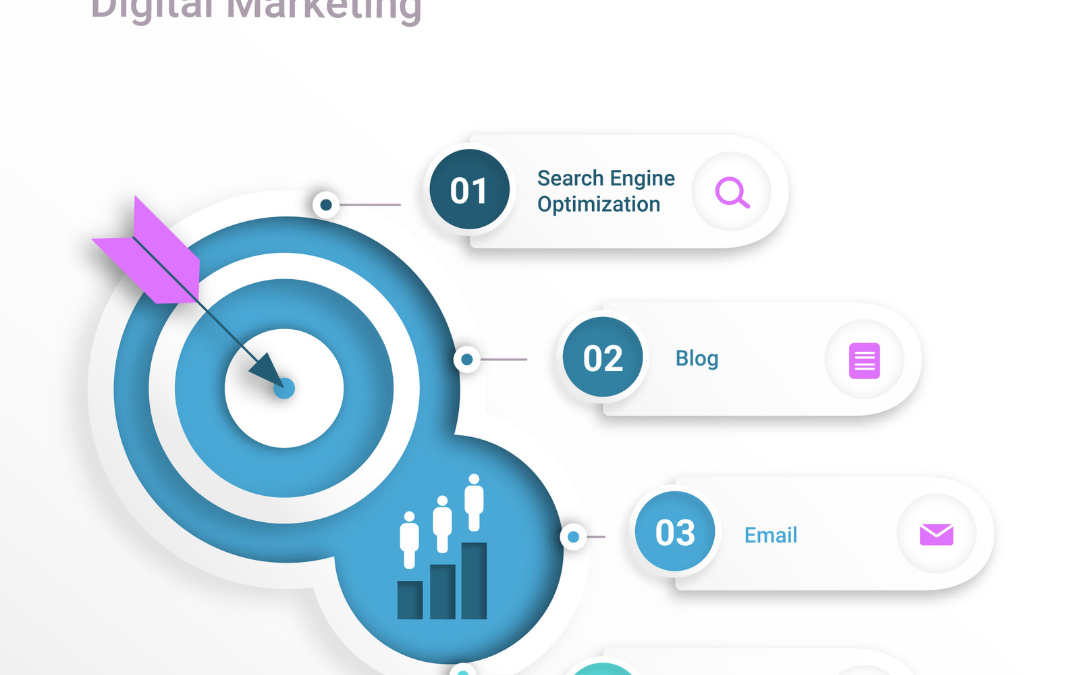Exploring the 4 Types of Digital Marketing:
Welcome to our comprehensive guide on the four primary types of digital marketing. In today’s technologically advanced world, businesses are leveraging digital marketing strategies to reach and engage with their target audience effectively. The internet has revolutionized the way companies promote their products and services, making digital marketing an indispensable tool for success. In this guide, we will delve into the world of digital marketing and provide valuable insights, techniques, and best practices that will empower you to navigate the dynamic landscape of online promotion and marketing.
In today’s digitally driven world, effective digital marketing is essential for businesses to thrive and succeed. The four primary types of digital marketing, including Search Engine Optimization (SEO), Social Media Marketing (SMM), Content Marketing, and Pay-per-Click Advertising (PPC), offer unique opportunities to connect with your target audience, increase brand visibility, and drive business growth.
By implementing these digital marketing strategies and following best practices, businesses can enhance their online presence, attract qualified leads, and achieve their marketing goals. It is important to remember that while each type of digital marketing has its own benefits and strengths, a holistic and integrated approach is often the most effective. Combining multiple strategies and channels can create a synergistic effect that amplifies your marketing efforts.
With the right mix of digital marketing strategies tailored to your business objectives and target audience, you can outrank your competitors, increase brand awareness, drive website traffic, and ultimately achieve long-term success in the digital realm.
What Are the Four Pillars of Digital Marketing?
1. Search Engine Optimization (SEO)
SEO plays a pivotal role in digital marketing by improving a website’s visibility in search engine results pages (SERPs). It involves optimizing various aspects of a website, such as content, keywords, meta tags, and backlinks, to rank higher in search engine results. Effective SEO strategies can drive organic traffic to a website and increase its online presence.
Benefits of SEO:
- Increased organic visibility in search engine results
- Higher website traffic and engagement
- Improved brand credibility and trust
- Cost-effective compared to paid advertising
- Long-term sustainability and consistent results
Examples of SEO Techniques:
- Keyword research and optimization
- On-page optimization (meta tags, headings, content optimization)
- Off-page optimization (link building, social media signals)
- Technical SEO (website structure, site speed, mobile optimization)
2. Search Engine Marketing (SEM)
SEM, also known as paid search marketing or pay-per-click (PPC) advertising, involves placing ads on search engine results pages to drive targeted traffic to a website. Unlike SEO, SEM relies on paid Google advertising to achieve immediate visibility and results.
Benefits of SEM:
- Immediate visibility and exposure on search engine results pages
- Targeted advertising to reach specific demographics
- Control over ad spend and budget allocation
- Measurable and trackable results through analytics tools
- Ability to test and optimize campaigns in real-time
Examples of SEM Techniques:
- Google Ads
- Bing Ads
- Display advertising
- Remarketing campaigns
- Shopping ads
3. Social Media Marketing (SMM)
SMM involves leveraging social media platforms to promote products, services, or brands and engage with the target audience. Social media platforms provide businesses with an opportunity to create and share compelling content, build brand awareness, and foster meaningful relationships with customers.
Benefits of SMM:
- Wide reach and access to a large user base
- Enhanced brand visibility and recognition
- Direct communication and engagement with customers
- Targeted advertising based on demographics, interests, and behaviors
- Opportunities for user-generated content and viral campaigns
Examples of SMM Techniques
Creating and managing business profiles on platforms like Facebook, Instagram, Twitter, LinkedIn, etc.
- Sharing engaging content, such as posts, videos, and images, to attract and retain followers
- Running targeted ad campaigns on social media platforms
- Influencer marketing by collaborating with popular social media influencers
- Social media contests and giveaways to encourage user participation
4. Content Marketing
Content marketing focuses on creating and distributing valuable, relevant, and consistent content to attract and retain a clearly defined audience. The goal is to provide valuable information, entertain, educate, or inspire the target audience while indirectly promoting a brand or product.
Benefits of Content Marketing:
- Establishing brand authority and thought leadership
- Building trust and credibility with the audience
- Increased organic traffic and search engine visibility
- Enhanced customer engagement and loyalty
- Opportunities for viral content and increased social sharing
Examples of Content Marketing Techniques:
- Blog posts and articles
- E-books and whitepapers
- Infographics and visual content
- Videos and webinars
- Podcasts and audio content
FAQs about the 4 Types of Digital Marketing:
- Q: What is the difference between SEO and SEM?
- A: While both SEO and SEM aim to improve a website’s visibility in search engine results, SEO focuses on organic (unpaid) methods, while SEM involves paid advertising on search engines.
- Q: Can businesses use more than one type of digital marketing simultaneously?
- A: Absolutely! In fact, many businesses employ a combination of these types to maximize their reach and impact. For example, they may use SEO to improve their organic visibility while running SEM campaigns for immediate results.
- Q: Is social media marketing only beneficial for B2C businesses?
- A: Not at all! While social media marketing is commonly associated with B2C businesses, it can also be highly effective for B2B businesses. Platforms like LinkedIn offer targeted advertising options and networking opportunities for B2B companies.
- Q: How can I measure the success of my digital marketing efforts?
- A: Each type of digital marketing has its own set of metrics and analytics tools to track and measure performance. For example, SEO success can be measured through organic traffic, keyword rankings, and conversion rates, while SEM success can be measured through click-through rates, cost per click, and conversion rates.
- Q: Is content marketing only limited to written content?
- A: No, content marketing encompasses a wide range of content formats, including written, visual, and audio content. Businesses can choose the format that aligns best with their target audience and goals.
- Q: Which type of digital marketing is the most cost-effective?
- A: The cost-effectiveness of each type depends on various factors, including the industry, target audience, and marketing goals. Generally, SEO and content marketing tend to be more cost-effective in the long run, while SEM can provide immediate results with a higher budget.
- How can I measure the success of my digital marketing efforts?
Measuring the success of your digital marketing efforts is crucial to track performance and make informed decisions. Here are some key metrics and tools you can utilize:
- Website Analytics: Use web analytics tools like Google Analytics to track website traffic, user behavior, conversion rates, and other valuable metrics. Analyse data such as the number of visitors, page views, average time on site, bounce rate, and conversion funnels to gain insights into the effectiveness of your digital marketing campaigns.
- Key Performance Indicators (KPIs): Identify KPIs that align with your business goals, such as lead generation, sales, email sign-ups, or social media engagement. Regularly monitor these metrics to gauge the success of your digital marketing efforts and make data-driven optimizations.
- Social Media Metrics: Social media platforms provide analytics tools that offer insights into post reach, engagement, follower growth, and audience demographics. Track metrics such as likes, shares, comments, click-through rates, and conversion rates to assess the impact of your social media marketing efforts.
- Email Marketing Metrics: If you engage in email marketing, monitor metrics like open rates, click-through rates, conversion rates, and unsubscribe rates. These metrics will help you evaluate the effectiveness of your email campaigns and optimize your strategies.
- Return on Investment (ROI): Calculate the ROI of your digital marketing campaigns by comparing the cost of your marketing efforts to the revenue generated. Consider both monetary returns and other valuable outcomes, such as increased brand awareness or customer satisfaction.
- Customer Surveys and Feedback: Collect feedback from your customers through surveys, reviews, and social media interactions. Customer feedback can provide valuable insights into their satisfaction levels, preferences, and areas for improvement.
By regularly monitoring and analyzing these metrics, you can gain a deeper understanding of the effectiveness of your digital marketing efforts and make data-driven decisions to optimize your strategies for better results.
We can conclude by saying that in today’s digital landscape, understanding and utilizing the four types of digital marketing is essential for businesses seeking to thrive and succeed. Whether it’s improving organic visibility through SEO, driving targeted traffic through SEM, engaging with the audience on social media, or creating valuable content, each type offers unique opportunities and benefits.
By embracing these digital marketing strategies and tailoring them to their specific needs and goals, businesses can effectively connect with their target audience, build brand awareness, and drive growth. So, don’t miss out on the power of digital marketing and make sure to leverage its full potential for your business’s success.
Remember, digital marketing is not just about ranking higher on search engines or gaining more followers on social media. It’s about building meaningful connections, providing value to your audience, and delivering an exceptional user experience. So, embrace the power of digital marketing, adapt to the changing landscape, and seize the opportunities it presents for your business growth.
If you need assistance in implementing effective digital marketing strategies or optimizing your online presence, don’t hesitate to reach out to our team of experts at ZoomUp Media . Our digital marketing agency here to help you navigate the dynamic world of digital marketing and drive your business towards success.
Thank you for taking the time to read this comprehensive guide on the four types of digital marketing. We hope it has provided you with valuable insights and knowledge to embark on your digital marketing journey with confidence. Remember, your digital marketing success starts with a solid foundation and a strategic approach. So, get ready to elevate your online presence and make a lasting impact in the digital realm!
Visit ZoomUp Media for more such informative blogs :
Before you , leave your valuable comments below!

